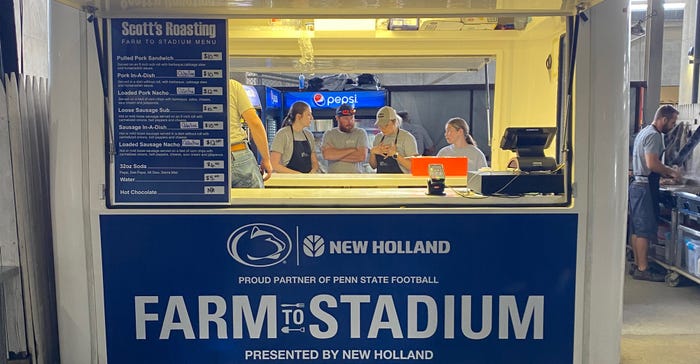
Right smack in the middle of Pennsylvania, Centre County is in the heart of the state’s farming region.
But for a few months each fall, this strong farming community becomes a hotbed for college football. More than 100,000 rabid Penn State fans make the trek over mountains to Happy Valley each week to see their Nittany Lions play.
For a company such as New Holland, it’s a big chance to show what the company is all about. Now, the company is partnering with a local farmer to sell locally grown concession items at each game through its New Holland Farm to Stadium initiative. According to Penn State, it is the first such concession concept in college football.
New Holland, which is headquartered in New Holland, Pa., has a long-standing relationship with Penn State. It tested its biodiesel-powered tractors on Penn State’s research farms in the 2000s.
The company started making its presence known at Penn State athletic events, including football games, last year with advertising around the stadium, and through digital ads and announcements. Mark Lowery, director of commercial marketing for New Holland, says the company wanted to go broader to appeal to people who may not have a farm background.
“It was how do we start telling the story [of ag] to the masses at Beaver Stadium?” Lowery says. “This farm-to-fork initiative is a start to help do that.”
Scott’s Roasting LLC of Bellefonte, Pa., brought its well-known pulled pork sandwiches, loose sausage sandwiches and pork nachos to Penn State’s first home game Sept. 10 against Ohio, selling it in a small concession trailer lined with New Holland insignia. The farm uses New Holland equipment and is planning on bringing some of that equipment to future games.
Changing to survive
Jason Scott runs Scott’s Roasting with his mother and father, George and Brenda; his wife, Amanda; and his three daughters, Bailey, Madison and Cameron. They raise pigs, a small beef herd and some crops on two farms — the farm is called Sylvan Acres Lane — that have been in the family since the early 1950s.
George and Brenda handle the financial end of the farm, while Jason oversees herd management.
The Scotts raise 800 to 1,000 pigs and have 150 breeding sows. The roasting business was started by George in 1994 after the farm’s main farrowing barn burned down. Then a devastating disease wiped out 75% of the herd.
Jason says his father wanted to make changes or get out of the business entirely. “Dad took a leap of faith and started roasting pigs,” he says.
Scott’s Roasting was born. About 400 pigs a year are used for roasting and sausage making. Jason says the farm is independent and doesn’t raise pigs for an integrator. Instead, they make most of their money selling roasted pigs and pork cuts to local markets and private customers, and they also sell breeding stock to other farms.
“It’s not always the easy road, but we make it work, and honestly for a little food for thought, local markets have exploded since the pandemic,” he says.
The business consists of four concession trailers the family takes to local fairs and events starting in spring. They also bring the trailers to Tractor Supply Co. store parking lots.
Jason says that Penn State approached him and his family about partnering with New Holland on its farm-to-fork initiative, as it was looking for a local food vendor who sourced products locally. He was at the first football game of the season.
“It went well. Going into a new event with not knowing what to expect … it was hectic, and I think it went very well,” he says.
It’s not easy raising pigs independent of an integrator. Jason says he and his family have had to create their own local market for pork, which has taken time.
“Just over the years we developed a clientele that appreciates the quality of our hogs, and they still like the old-time butchering and getting together with family and filling your freezer the old-fashioned way,” he says, adding that the pig roasting business subsidizes the farm during the slow summer period.
Still, there aren’t enough local customers to account for all the pigs, and this can be stressful. “Some go to local auctions, but that’s not always easy because when you have animals to get rid of, you are at the mercy of the market,” he says.
The family farms 530 acres of corn, soybeans, wheat and grass hay. The soybeans are the cash crop, while hay is fed to the farm’s small beef cattle herd. Most of the corn, 75%, goes into the pigs’ feed ration.
“We use money from the soybeans to help pay for seed and fertilizer,” Jason says. “Wheat is grain as cash, and we use the straw as bedding.”
Selling to the masses
Lowery says the initiative could be replicated at other college football stadiums or arenas around the country if this one is successful. “We know that college football, in particular, is pretty popular with the masses. We want to see what we learn and look at other key stadiums where we want to replicate a similar initiative,” he says.
Scott hopes the small stand at Beaver Stadium will not only bring notoriety to his farm, but also the local farming community, too.
“Every week in the fall, we basically have a small town move into the area for the day, so to be able to capitalize and get local products in there, it's a big thing, and New Holland is backing me up,” he says. “A lot of local farmers are happy about it. It's definitely helping us reach a broader clientele that don’t come to fairs, that don’t come to arts and crafts festivals.”
About the Author(s)
You May Also Like






